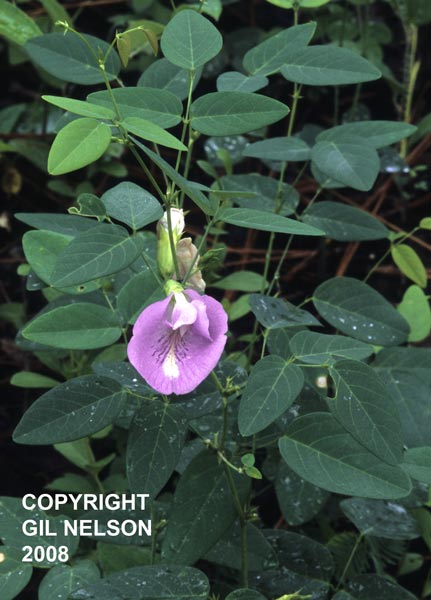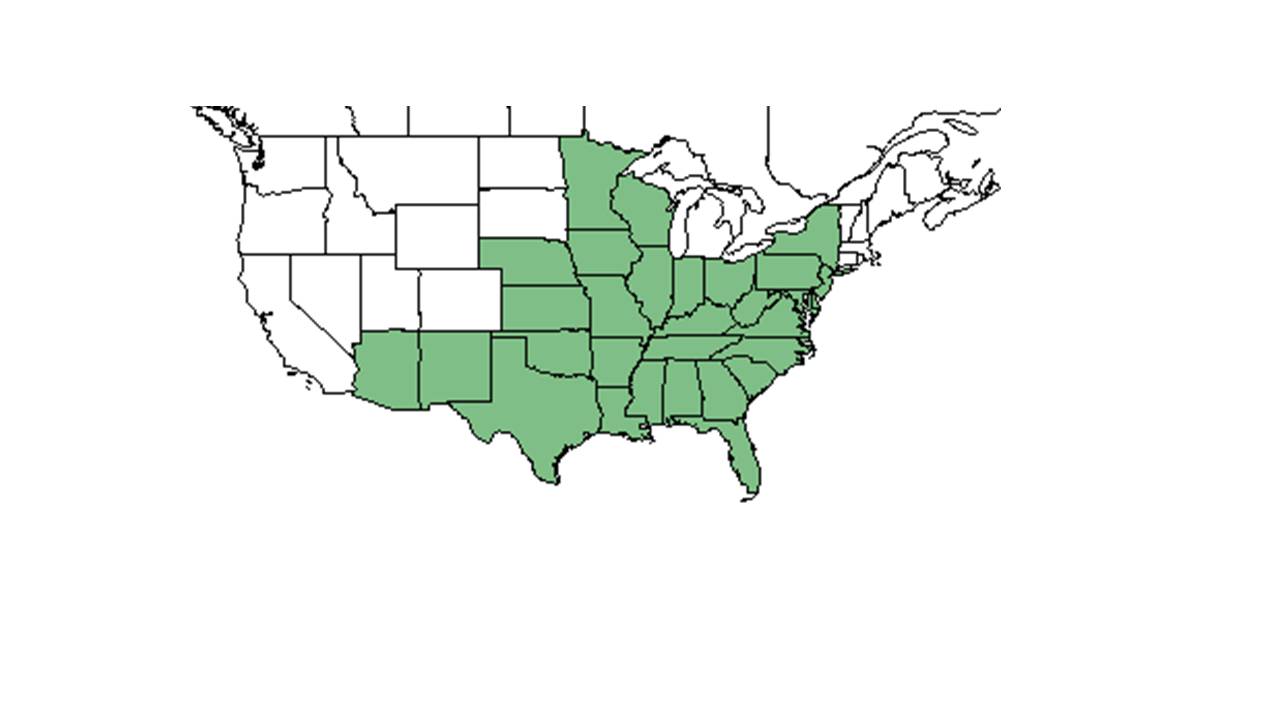Difference between revisions of "Clitoria mariana"
Laurenloria (talk | contribs) |
|||
| Line 18: | Line 18: | ||
}} | }} | ||
| − | Common | + | Common names: Atlantic pigeonwings; butterfly pea |
==Taxonomic notes== | ==Taxonomic notes== | ||
Synonym: ''Martiusia mariana'' (L.) Small [http://www.itis.gov/servlet/SingleRpt/SingleRpt?search_topic=TSN&search_value=26542 ITIS-Integrated Taxonomic Information System.gov] | Synonym: ''Martiusia mariana'' (L.) Small [http://www.itis.gov/servlet/SingleRpt/SingleRpt?search_topic=TSN&search_value=26542 ITIS-Integrated Taxonomic Information System.gov] | ||
Revision as of 18:08, 26 June 2018
| Clitoria mariana | |
|---|---|

| |
| photo by Gil Nelson | |
| Scientific classification | |
| Kingdom: | Plantae |
| Division: | Magnoliophyta - Flowering plants |
| Class: | Magnoliopsida – Dicotyledons |
| Order: | Fabales |
| Family: | Fabaceae ⁄ Leguminosae |
| Genus: | Clitoria |
| Species: | C. mariana |
| Binomial name | |
| Clitoria mariana L. | |

| |
| Natural range of Clitoria mariana from USDA NRCS Plants Database. | |
Common names: Atlantic pigeonwings; butterfly pea
Contents
Taxonomic notes
Synonym: Martiusia mariana (L.) Small ITIS-Integrated Taxonomic Information System.gov
Description
It has a vining habit, where some are large vines whereas other are small erect plants[1]. It is paraheliotropic.[2]
Clitoria mariana is a trailing, twining, perennial, herbaceous vine growing up to 0.5-1 m long with glabrous to short-pubescent stems. The leaves are pinnately 3-foliolate. The leaflets are entire, mostly ovate to lanceolate or ovate-oblong to somewhat elliptic, growing 2-7 cm long; glabrous above and glabrous or occasionally short-pubescent beneath, stipellate; stipules ovate-lanceolate to lanceolate, ca. 2-4 mm long, tardily deciduous, striate. The racemes are axillary, peduncles growing 0.5-4(6) cm long, usually shorter than subtending leaves, are 1-3 flowered; pedicels are usually glabrous or rarely short-pubescent, (2) 4-10 mm long, each subtended by a triangular to lanceolate, striate bract growing 1-3 mm long and with a pair of linear bractlets growing3-6 mm long at or near the summits. The calyx is usually glabrous or rarely short-pubescent, somewhere bilabiate. The tube is cylindric, growing 1-14 cm long, upper lobes are widely triangular, acute, growing 4-6 mm long, lateral lobes ovate-lanceolate, acuminate, grwoing 5-7 mm long, lowermost lobe lanceolate, acuminate, growing 6-8 mm long. The petals are pale blue or lavender in color, the standard are spurless, growing 4-6 cm long, and 3-4 cm wide. The wing petals are smaller and attahced to the strongly incurved keel petals. The stamens are monadelphous. The legumes are flattened, oblong-linear, growing 3-6 cm long; stipe elongate, growing 1-2 cm long, valves longitudinally twisting upon dehiscence. The seeds are sticky and adherent.[3]
Distribution
Ecology
Habitat
It occurs in frequently burned longleaf pine-turkey oak sandhills,[1] sand pine scrub (Entisols), [4] flatwoods (Spodosols) [5] upland longleaf pine-wiregrass communities (Ultisols), and in the margins of mixed hardwood communities[1] and loblolly pine plantations. [6] It ranges from dry [7] to moist sandy areas.[1] It can live in partially shaded areas (54% ambient light conditions). [8] It can be found in longleaf pine flatwoods communities. [5] It is also found in loblolly pine communities. [6] It can also be found in sand pine scrub. [4] It thrives in frequently burned areas, and typically occurs in high light environments, but also tolerates partial shade.[1] Although it occasionally occurs in frequently burned old-field communities, it is more typical of native pine communities which have minimal soil disturbance.[1] Associated species include Desmodium nudiflorum, D. ochroleucum, Quercus laevis, Q. stellata, Pinus palustris, P. echinata, Centrosema virginianum, Carya tomentosa, with other weeds, vines and trees in roadside ditches.[1]
Phenology
It flowers from May to September with peak inflorescence in July and fruits from September to October.[1][9]
Seed dispersal
This species disperses when carried externally by vertebrates. [10]
Fire ecology
Because it was found in Henley Park plots which were burned every one to two years in the winter, it is fire-tolerant. [5] It resprouts quickly after fire, which can be supported by the fact that it resprouted within a month after fire in Pavon's study. [11] It attained its peak in two-year rough plots at Henley Park, plots that had undergone two growing seasons since the last burn. [5] This is supported by Greenberg's study, which shows the peak percent cover to be 16 months after fire around 80% [4]
Use by animals
It is a game-food plant,[6] so it is probably consumed by Gopherus polyphemus (Gopher tortoise) white-tailed deer, and bobwhite quail. [12]
Conservation and management
Cultivation and restoration
Photo Gallery
References and notes
Florida State University Robert K. Godfrey Herbarium database. URL: http://herbarium.bio.fsu.edu. Last accessed: June 2014. Collectors: Loran C. Anderson, Wilson Baker, R.K. Godfrey, William Reese, Paul Redfearn, Robert L. Lazor, R. Kral, C. Jackson, O. Lakela, Paul R. Fantz, James R. Burkhalter, Andre F. Clewell, Travis MacClendon, Karen MacClendon, R. A. Norris, Rodie White, Kevin Oakes, Delzie Demaree, John W. Thieret, Alex Lasseigne, L. J. Uttal, D. S. Correll, H. B. Correll, Norlan C. Henderson, James D. Ray, Jr., Charles S. Wallis, Bayard Long, F. S. Earle, C. F. Baker, R. L. Wilbur, Mary E. Wharton, Raymond Athey, W.C. Coker, A. B. Seymour, A. E. Radford, and Rachel Williamson. States and Counties: Florida: Calhoun, Collier, Escambia, Flagler, Franklin, Gadsden, Hernando, Jackson, Jefferson, Lafayette, Leon, Liberty, Okaloosa, Taylor, Wakulla, and Walton. Georgia: Coffee, Grady, McIntosh, Pike, and Thomas. Alabama: Lee. North Carolina: Pamlico, Wake, and Wilson. Arkansas: Conway, Garland, Pulaski, and Saline. Missouri: Carter, Douglas, McDonald. Louisiana: Caddo, and Jackson. Virginia: Alleghany, Montgomery, and Sussex. Texas: Callahan, Morris, Upshur, and Van Zandt. Mississippi: Tishomingo. Oklahoma: Latimer. New Jersey: Cape May. Kentucky: Livingston, and Nelson. South Carolina: Darlington.
- ↑ 1.0 1.1 1.2 1.3 1.4 1.5 1.6 1.7 Florida State University Robert K. Godfrey Herbarium database. URL: http://herbarium.bio.fsu.edu. Last accessed: June 2014. Collectors: Loran C. Anderson, Wilson Baker, R.K. Godfrey, William Reese, Paul Redfearn, Robert L. Lazor, R. Kral, C. Jackson, O. Lakela, Paul R. Fantz, James R. Burkhalter, Andre F. Clewell, Travis MacClendon, Karen MacClendon, R. A. Norris, Rodie White, Kevin Oakes, Delzie Demaree, John W. Thieret, Alex Lasseigne, L. J. Uttal, D. S. Correll, H. B. Correll, Norlan C. Henderson, James D. Ray, Jr., Charles S. Wallis, Bayard Long, F. S. Earle, C. F. Baker, R. L. Wilbur, Mary E. Wharton, Raymond Athey, W.C. Coker, A. B. Seymour, A. E. Radford, and Rachel Williamson. States and Counties: Florida: Calhoun, Collier, Escambia, Flagler, Franklin, Gadsden, Hernando, Jackson, Jefferson, Lafayette, Leon, Liberty, Okaloosa, Taylor, Wakulla, and Walton. Georgia: Coffee, Grady, McIntosh, Pike, and Thomas. Alabama: Lee. North Carolina: Pamlico, Wake, and Wilson. Arkansas: Conway, Garland, Pulaski, and Saline. Missouri: Carter, Douglas, McDonald. Louisiana: Caddo, and Jackson. Virginia: Alleghany, Montgomery, and Sussex. Texas: Callahan, Morris, Upshur, and Van Zandt. Mississippi: Tishomingo. Oklahoma: Latimer. New Jersey: Cape May. Kentucky: Livingston, and Nelson. South Carolina: Darlington.
- ↑ KMR observation in July on Pebble Hill Plantation, Georgia.
- ↑ Radford, Albert E., Harry E. Ahles, and C. Ritchie Bell. Manual of the Vascular Flora of the Carolinas. 1964, 1968. The University of North Carolina Press. 636. Print.
- ↑ 4.0 4.1 4.2 Greenberg, C. H. (2003). "Vegetation recovery and stand structure following a prescribed stand-replacement burn in sand pine scrub." Natural Areas Journal 23: 141-151.
- ↑ 5.0 5.1 5.2 5.3 Brewer, J. S. and S. P. Cralle (2003). "Phosphorus addition reduces invasion of a longleaf pine savanna (southeastern USA) by a non-indigenous grass (Imperata cylindrica)." Plant Ecology 167: 237-245.
- ↑ 6.0 6.1 6.2 Cushwa, C. T. (1966). The response of herbaceous vegetation to prescribed burning. Asheville, USDA Forest Service.
- ↑ Walker, J. and R. K. Peet (1983). "Composition and species diversity of pine-wiregrass savannas of the Green Swamp, North Carolina." Vegetation 55: 163-179.
- ↑ Cathey, S. E., L. R. Boring, et al. (2010). "Assessment of N2 fixation capability of native legumes from the longleaf pine-wiregrass ecosystem." Environmental and Experimental Botany 67: 444-450.
- ↑ Nelson, G. PanFlora: Plant data for the eastern United States with emphasis on the Southeastern Coastal Plains, Florida, and the Florida Panhandle. www.gilnelson.com/PanFlora/ Accessed: 7 DEC 2016
- ↑ Kirkman, L. Katherine. Unpublished database of seed dispersal mode of plants found in Coastal Plain longleaf pine-grasslands of the Jones Ecological Research Center, Georgia.
- ↑ Pavon, M. L. (1995). Diversity and response of ground cover arthropod communities to different seasonal burns in longleaf pine forests. Tallahassee, Florida A&M University.
- ↑ Hainds, M. J., R. J. Mitchell, et al. (1999). "Distribution of native legumes (Leguminoseae) in frequently burned longleaf pine (Pinaceae)-wiregrass (Poaceae) ecosystems." American Journal of Botany 86: 1606-1614.